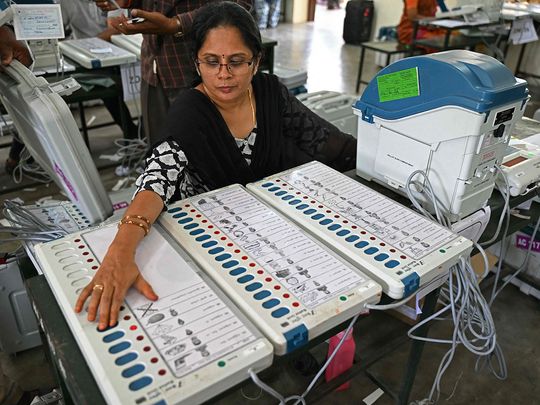
Although first experimented with in 1982, Electronic Voting Machines or EVMs were first used in a big way in India in 2001. In these 23 years of EVMs, many ruling parties in both the centre and the states have lost elections. EVMs have stood the test of time.
Why, then, do we hear growing concerns about EVM rigging in India’s elections?
Firstly, it is great that we have people and parties who go into the technology and processes of EVMs, coming up with ever-newer possibilities of manipulation. Eternal vigilance is the price of liberty. Whether it is journalist Poonam Agarwal or advocate Prashant Bhushan or former bureaucrat Kannan Gopinathan, they’re all doing great public service by playing the role of watchmen of the voting process.
Yet, no critic has been able to make a serious, evidence-based allegation that any election ever was won through the rigging of EVMs. Such claims have been made only by sore losers.
In 2009, when the Bharatiya Janata Party LK Advani lost his last chance to be prime minister, he blamed EVMs and wanted to return to the paper ballot. Mr Advani did not revisit his objections when his party won a clear majority in the 2014 general elections.
In 2017, when the Aam Aadmi Party lost the Punjab assembly elections, they said the EVMs were manipulated. Once again, they did not reassert the claim when they won the state in 2022. The AAP could also not explain that if the BJP government at the centre was rigging EVMs, why would they give themselves only 3 out of 70 seats in Delhi in 2015, or only 8 in 2020.
The Congress party has won many state elections since 2014. Some, like Chhattisgarh and Madhya Pradesh in 2018, or Karnataka in 2023, were such sweeping victories that they damaged the BJP’s perceived domination in the moment.
Conspiracy theory
EVM conspiracy theorists argue that the BJP lets the opposition win some elections so that no one can doubt the EVMs when they are indeed rigged in favour of the BJP. If we were to take such conspiracy theories to their logical end, it would seem the BJP wouldn’t be winning elections if it were not for EVMs.
The truth is that you can step out of your house in north India and see the Modi wave. If you just go around asking people who they’re voting for, you’ll meet so many people saying BJP/Modi that you’ll wonder how they lose any election at all.
But if you shut yourself in an anti-BJP echo chamber, the EVM conspiracy theory is soothing. Human beings love conspiracy theories as they help explain the inexplicable. Those who don’t vote Modi are so bewildered to see the BJP’s history-making sweep that they don’t believe it can be real.
Yet such people also contradict themselves by ruminating about PM Modi’s relentless publicity machine, the ideological appeal of Hindu nationalism or the political appeal of Indian nationalism, the role of the media and campaign finance, and the smart ones may also be able to see how the BJP has built a formidable party organisation. If all these are true, why does the BJP need to rig EVMs?
Overseeing the voting process
The Luddite obsession with technology misses the woods for the trees. Yes machines and chips can be manipulated, as can paper ballots. There is no way of conducting voting that cannot be manipulated in one way or the other. Which is why the focus of election integrity activists should be more on administrative and security protocols than technology — which can be and is verified in various ways.
Since 2013, EVM votes are verified through VVPAT, the Voter Verifiable Paper Audit Trail. When you press the button, a paper comes out in a separate box showing the symbol you pressed. This is enough to assure you that the popular jokes that all buttons press the BJP’s lotus symbol is plain wrong.
Those demanding a return to the paper ballot should recall what a BJP lawmaker just tried to do in Chandigarh mayoral elections. Had it not been for the CCTV cameras and the Supreme Court, he would have gotten away with physically tampering with the ballots. Those demanding a return to paper ballots should remember the booth capturing of the ‘90s. They should be careful what they ask for.
Whether it is EVMs or paper ballots, opposition parties need to work on making sure they have party workers present in remote polling booths to oversee the voting process and report any irregularities. It is the administrative protocols of the Election Commission that make sure EVMs are credible. These protocols needs greater vigilance from political parties and civil society alike.
Declining trust
According to opinion polls by Lokniti-CSDS, public trust is declining in EVMs. The distrust has doubled in the last 5 years. Today even Rahul Gandhi is suggesting EVMs are rigged because he knows his party is going to have a third consecutive embarrassing defeat against the BJP.
If opposition parties and their supporters continue to discredit the voting process, opposition voters may not come out and vote. If the EVMs are rigged, they might say, what’s the point of queuing up at the polling booth in the heat?
Let us be watchful guardians of Indian elections but let us not throw the baby out with the bathwater.










